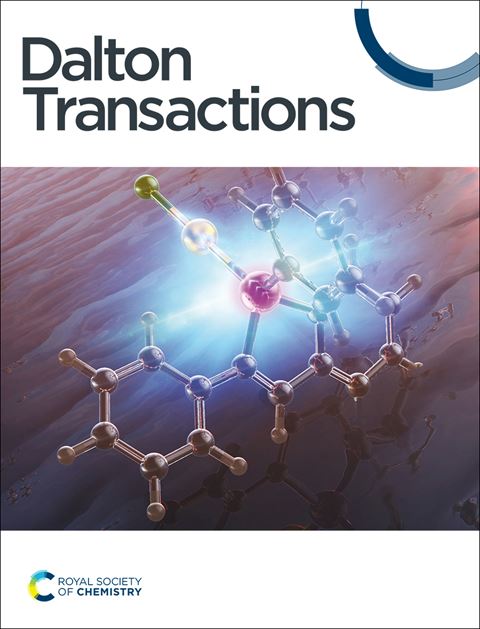锑与铋:Cat{[MCl5](I2)}卤素键联超分子配合物的结构差异
IF 3.5
3区 化学
Q2 CHEMISTRY, INORGANIC & NUCLEAR
引用次数: 0
摘要
四种新的卤素键连接的氯锑酸盐(III)和绿铋酸盐(III), (H2bpe){[MCl5](I2)} (M = Sb(III) (1);M = Bi(III) (2);bpe - 1,以叔(4-pyridil)乙烷)和(H2bpp) {[MCl5] (I2)} (M =某人(III) (3);M = Bi(III) (4);bpp = 1,3-双(4-吡啶)丙烷)是由Sb2O3/Bi2O3、I2和相应的双(吡啶)在HCl中反应合成的。尽管它们的超分子阴离子部分的分子式相同,但它们表现出显著的结构多样性,揭示出三种不同的结构类型。用理论方法研究了1-4中卤素键的特征。本文章由计算机程序翻译,如有差异,请以英文原文为准。
Antimony vs bismuth: structural differences in Cat{[MCl5](I2)} halogen bond-linked supramolecular complexes
Four new hybrid chloroantimonates(III) and chrorobismuthates(III) with halogen bond-linked I2, (H2bpe){[MCl5](I2)} (M = Sb(III) (1); M = Bi(III) (2); bpe – 1,2-bis(4-pyridil)ethane) and (H2bpp){[MCl5](I2)} – (M = Sb(III) (3); M = Bi(III) (4); bpp = 1,3-bis(4-pyridil)propane)) were synthesized via reaction between Sb2O3/Bi2O3, I2 and corresponding bis(pyridines) in HCl. Despite sharing the same formulae of supramolecular anionic parts, they show significant structural diversity, revealing three different structural types. Features of halogen bond in 1-4 were examined by theoretical methods.
求助全文
通过发布文献求助,成功后即可免费获取论文全文。
去求助
来源期刊

Dalton Transactions
化学-无机化学与核化学
CiteScore
6.60
自引率
7.50%
发文量
1832
审稿时长
1.5 months
期刊介绍:
Dalton Transactions is a journal for all areas of inorganic chemistry, which encompasses the organometallic, bioinorganic and materials chemistry of the elements, with applications including synthesis, catalysis, energy conversion/storage, electrical devices and medicine. Dalton Transactions welcomes high-quality, original submissions in all of these areas and more, where the advancement of knowledge in inorganic chemistry is significant.
 求助内容:
求助内容: 应助结果提醒方式:
应助结果提醒方式:


